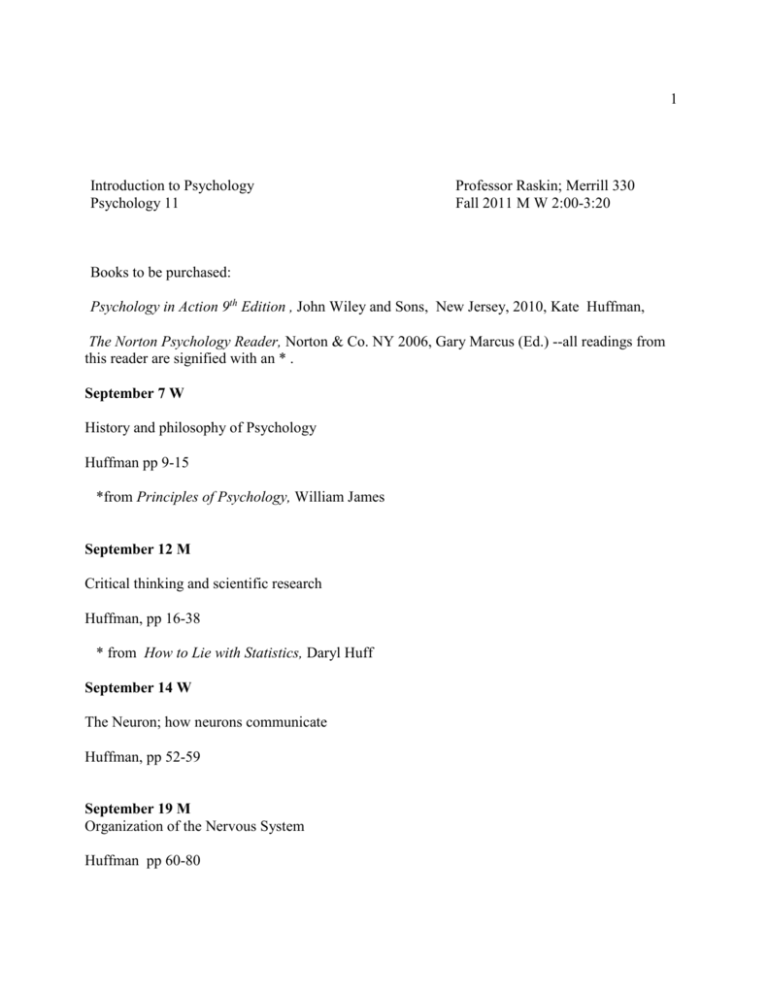History of Psychiatry
advertisement

1 Introduction to Psychology Psychology 11 Professor Raskin; Merrill 330 Fall 2011 M W 2:00-3:20 Books to be purchased: Psychology in Action 9th Edition , John Wiley and Sons, New Jersey, 2010, Kate Huffman, The Norton Psychology Reader, Norton & Co. NY 2006, Gary Marcus (Ed.) --all readings from this reader are signified with an * . September 7 W History and philosophy of Psychology Huffman pp 9-15 *from Principles of Psychology, William James September 12 M Critical thinking and scientific research Huffman, pp 16-38 * from How to Lie with Statistics, Daryl Huff September 14 W The Neuron; how neurons communicate Huffman, pp 52-59 September 19 M Organization of the Nervous System Huffman pp 60-80 2 September 21 W Function of the Nervous System Film: Secrets of the Mind *from How the Mind Works, Steven Pinker * from The Birth of the Mind, Gary Marcus September 26 M Overview of sensory systems Huffman, Chapter 4 September 28 W Sensation and Perception *from The Man Who Mistook his Wife for a Hat, Oliver Sacks * from Visual Intelligence, How We Create What We See, Donald D Hoffman Film: Discovering Psychology: Sensation and Perception October 3 M Developmental Psychology: Physical and Cognitive Huffman Chapter 9 *from The Scientist in the Crib, Alison Gopnik et al. October 5 W Developmental Psychology: Morality and Personality Huffman, Chapter 10 *from Decartes’ Baby, Paul Bloom *from The Nuture Assumption: Why Children Turn Out The Way They Do, Judith Rich Harris 3 October 10 M Mid-semester break October 12 W Development: Nature and Nurture Huffman pp 80-87 *from Galen’s Prophecy; Temperament in Human Nature, Jerome Kagan *from Not by Genes Alone, How Culture Transformed Human Evolution, Peter J. Richerson and Robert Boyd Film: The Baby’s brain October 17 M Development of Sexuality and Sexual Orientation Huffman Chapter 11 October 19 W In-class Exam #1 October 24 M Cognition: Measuring Consciousness: Huffman Chapter 5 *from: Flow: the Psychology of Optimal Experience, Mihaly Csikszentmihalyi October 26 W Cognition: Learning: Animal models; human learning Huffman Chapter 6 4 October 31 M Cognition: Memory Huffman Chapter 7 *from Searching for Memory, Daniel Schacter *from The Illusion of Conscious Will, Daniel Wegner November 2 W Cognition: Thinking, Language and Intelligence Huffman Chapter 8 *from The Language Instinct, Steven Pinker *from: The Bell Curve, Richard Hernstein and Charles Murray November 7 M Motivation and Emotion Huffman, Chapter 12 (but skip pp 414 to middle of 419) *from: Decartes’Error: Emotion, Reason and the Human Brain, Antonio Damasio November 9 W Social psychology: Thinking About Others Huffman pp 544-561 *from Influence: The Psychology of Persuasion, Robert B Cialdini November 14 M Social psychology: Obedience Huffman pp 561-581 Film: The Milgram Experiment revisited 5 November 16 W Exam II in class November 21 M & November 23 W Thanksgiving Break November 28 M Personality Huffman, Chapter 13 *from The Unconscious, Sigmund Freud *from Personality Plus, Malcolm Gladwell November 30 W Health: Stress and coping: Huffman, Chapter 3 *from Why Zebras Don’t Get Ulcers, Robert Sapolsky December 5 M Childhood Disorders: ADHD, Autism Huffman pp 473-483 *from Thinking in Pictures, and Other Reports from my Life with Autism, Temple Grandin December 7 W Disorders of Adolescence: Anorexia and Bulimia Nervosa Huffman pp 414-419 Film: Dying to be Thin December 12 M Adult Disorders: Anxiety, Depression and Schizophrenia Huffman pp 483-507 6 *from A Beautiful Mind, Silvia Nasser December 14 W Treatment for Psychological Disorders Huffman Chapter 15 This course is intended to provide students with a broad overview of psychology with emphasis on areas in developmental psychology, cognitive psychology, clinical psychology as well as a broad description of the neural underpinnings of behavior. The class will also prepare you to read basic philosophical arguments in psychology and to understand the different approaches in studying human behavior (research studies, case studies, community sampling, animal models etc.). Course Requirements: The class will be conducted in a lecture format , yet each class will include a discussion period during which time we will consider the readings from your text as well as from the Norton Reader that are marked with an * on the syllabus. Conversation regarding these readings will be run by a Socratic method: in other words, I will call on you randomly and expect that you have done the reading. There will be three exams throughout the semester: the first two exams will be multiple choice, identification and short answers. The last will be a scheduled final, which will be comprehensive, yet focused more on the last third of the class material. Grading Each exam is worth 30% ; in class participation -- and attendance --will be worth 10%. Attendance is required; more than 2 absences (that are unexcused by a Dean) will affect your grade. Honor Code At Amherst we expect that each student will engage in honest academic work during this class. Students should neither give nor receive assistance to others during the exams. We take cheating very seriously, and will take steps to prevent cheating, for example proctoring an exam if there is evidence of previous cheating. Research Participation You will be required to serve as a participant in at least 2, possibly 3, research experiments 7 conducted by Amherst College faculty and students. Over the course of the semester, we will talk about the design and results of many, many psychological studies. Your research participation will provide you with an opportunity to experience research from the inside out. In other words, you will see first-hand how an experiment is constructed to answer a psychological question. It is your responsibility to make sure you participate in the required number of studies. This means signing up for the required number of experiments and showing up at the scheduled time. Sign-up sheets are available in the main hallway in Merrill: my teaching assistant will be keeping track of whether you attend your required experimental sessions. If you would prefer a different approach to learning about how psychological research is conducted, see me and an alternate arrangement can be made. 8





